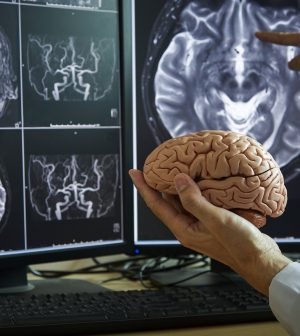- Could Your Grocery Store Meat Be Causing Recurring UTIs?
- Are You Making This Expensive Thermostat Error This Winter?
- Recognizing the Signs of Hypothyroidism
- 10 Strategies to Overcome Insomnia
- Could Artificial Sweeteners Be Aging the Brain Faster?
- Techniques for Soothing Your Nervous System
- Does the Water in Your House Smell Funny? Here’s Why
- Can a Daily Dose of Apple Cider Vinegar Actually Aid Weight Loss?
- 6 Health Beverages That Can Actually Spike Your Blood Sugar
- Treatment Options for Social Anxiety Disorder
Scientists May Have Spotted Stuttering’s Origins in the Brain

Stuttering is a neurological condition, not a psychological one, and scientists in Finland now believe they’ve found the disrupted network in the brain that may cause it.
“These findings explain well-known features of stuttering, such as the motor difficulties in speech production and the significant variability in stuttering severity across emotional states,” said senior study author Juho Joutsa, a professor of neurology at the University of Turku.
His team published its findings May 27 in the journal Brain.
According to the researchers, anywhere from 5% to 10% of children will develop a stutter, and 1% of adults also struggle with stuttering. President Joe Biden has been open about his lifelong management of his own stuttering.
“Stuttering was once considered a psychological disorder,” Jpoutsa said in a university news release. “However, with further research, it is now understood to be a brain disorder related to the regulation of speech production.”
But just where in the brain a person’s stutter might originate has been unknown.
In the study, Joutsa’s group first focused on 20 adults (ranging in age from 45 to 87) who all developed a stutter after suffering a stroke.
Although the location in the brain where the stroke occurred varied between patients, the strokes did all seem to affect one particular brain network — unlike strokes that did not bring on stuttering.
These networks connected up at specific “node” points in the brain.
Next, Joutsa’s team used MRI scans to look at the brains of 20 people with non-stroke, developmental stuttering.
They found that this form of stuttering was also linked to the same brain network nodes that had been implicated in stuttering triggered by strokes.
There was also a “dose-response” effect noted: The greater the structural changes in the nodes, the greater the severity of the stuttering, the researchers found.
All of this points to stuttering — whatever its trigger — being caused by changes in a specific brain network.
The nodes that are crucial in this network are brain structures such as the putamen, amygdala and claustrum, all located deep within the brain, and the connections between them.
“As major nuclei in the brain, the putamen regulates motor function and the amygdala regulates emotions,” Joutsa explained. “The claustrum, in turn, acts as a node for several brain networks and relays information between them.”
All of this, it is hoped, might lead to a better understanding of the root causes of stuttering, and new and improved methods of treating it, the researchers said.
More information
To find out more about stuttering, visit the Cleveland Clinic.
SOURCE: University of Turku, news release, May 28, 2024
Source: HealthDay
Copyright © 2026 HealthDay. All rights reserved.










